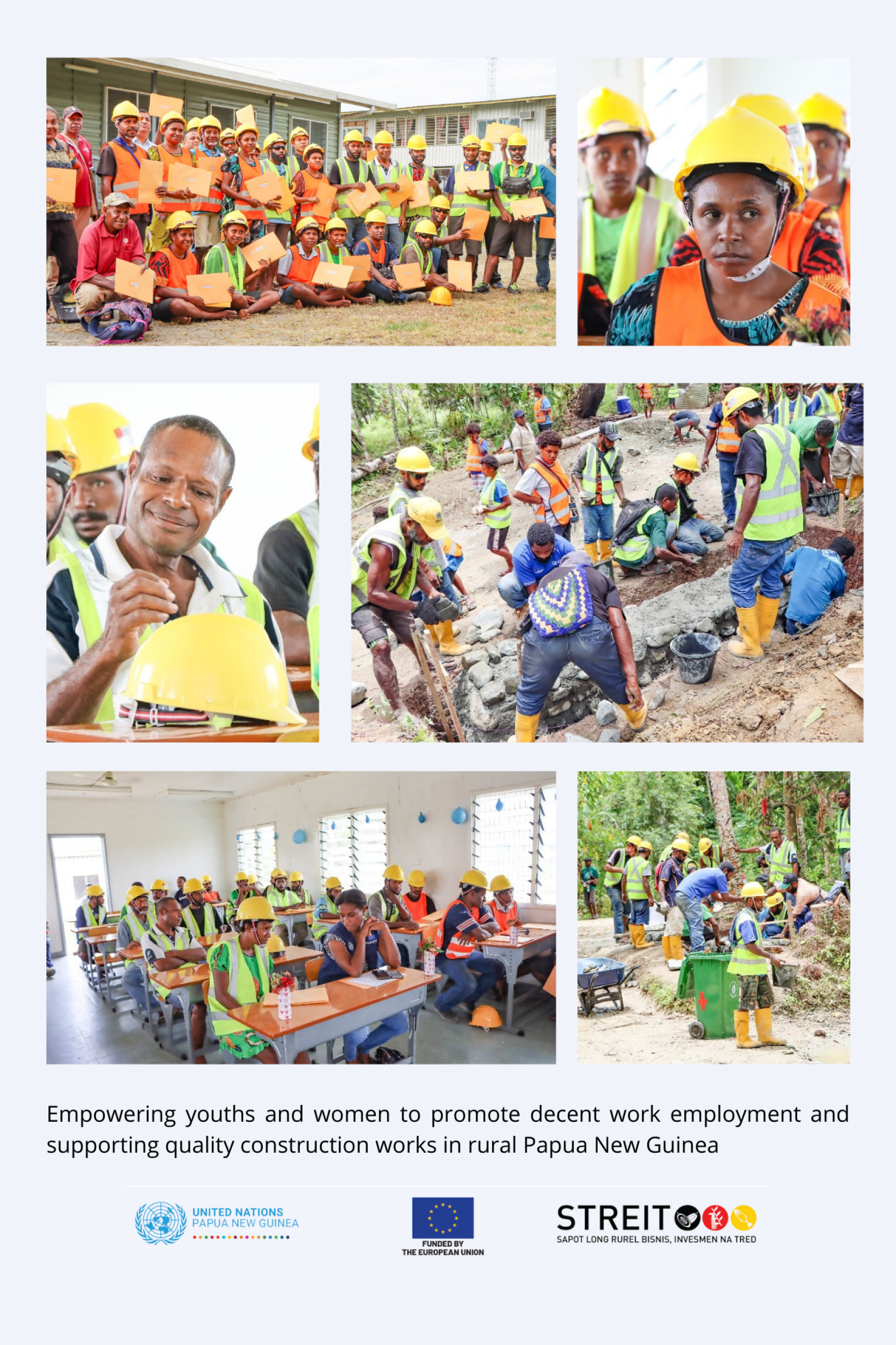Empowering youths and women to promote decent work employment and supporting quality construction works in rural Papua New Guinea
31 March 2022
|
EU-STREIT PNG Programme rolls out training workshops for youths and women on road works and maintenance skills in the Sepik Region to strengthen local skilled labour capacity for professional and quality transport infrastructure maintenance, rehabilitation and construction. |
|
Wewak, Papua New Guinea – EU Funded UN Joint STREIT PNG Programme, as part of its mission to strengthen local capacity for quality transport infrastructure works in Sepik Region, organised a skill training and capacity development course for 30 youths and women, pulled from different parts of East Sepik Province, on construction of stone masonry and gabion retaining structure that are critical for professional and quality construction works. Led by the International Labour Organization (ILO) in partnership with by the Technical and Vocational Education and Training (TVET) Centre in Wewak, the training aims to promote decent work employment for rural youth and women who lack in-demand practical qualifications in the area. The knowledge and skills taught during this course also help the trainees to qualify as skilled manpower, which in turn strengthens the locally available skilled labour capacity to support the road construction and development sector in the region. This partnership in co-organising the training also serves as a capacity development vehicle to further strengthen and enable TVET to design, develop and implement enhanced skill development services to the community members, securing the sustainability of the Programme’s support interventions when the EU-STREIT PNG concludes its activities in the Region. In attendance were nine young women participants who were looking forward to learn as much as they can from this seven-days intensive training module that concluded on 29 March 2022. Construction of stone masonry and gabion retaining structures with a particular focus on foundation of structures, dressing, bond stone, insertion of chips, joints, mortar, weep holes, pointing and plastering, assembling of gabion, placing, filling with stones, lacing and bracing, test and acceptance were amongst the main topics covered during this training. Officiating the training, the EU-STREIT PNG Programme Coordinator, Dr Xuebing Sun, highlighted how this training is practical and fits the professional construction market’s skill demands in the area. “By looking at the training curriculum and training structure, I think this training is being well designed. It is a very practical vocational training and some awareness promotion elements for Gender and Youth Inclusion,” adding “we need to learn from this kind of training to further transform our young people including girls and women who play equally important roles to meet the needs of our people.” “These knowledge and skills will prepare these young trainees to qualify as skilled manpower with the capacity to support road rehabilitation, maintenance and development sector in the Sepik Region,” Dr Sun further added. Also present at the opening held at the Yawasoro facility was TVET Wewak Principal Mr Tom Yalingen and Director for Provincial Works and Technical Services Mr James Baloiloi, who were pleased to see the active participation of youth and women trainees as well. “We think construction work is for men only. I think any kind of work women put their hands on is neat and of quality and this is a challenge to us, the men folks,” said a delighted Mr Baloiloi. For two female trainees, they were waiting to pay their way back to their studies and this training was an opportunity they couldn’t miss. Odilah Willie of Banak Village in Wewak District said: “I was not able to complete my year 12 studies because of school fee problems and I see this as a good chance for me.” While Damaris Finaka of Yangoru-Saussia District added: “I’m happy to become a role model for other girls to see and follow with the belief that road works is not a job for men only.” Damaris is looking forward to complete her Diploma Studies at the University of Papua New Guinea. This ILO-led training was also an opportunity for other graduate participants to build on their competencies and plan to impart their newly acquired knowledge and skills to villager fellows. One was Job Yawi, an enthusiast participant who had completed grade 12 studies and had been in the village for 10 years. “I want to say thank you to this programme to attend this course. I will go and train others as well in the village.” The participants are mostly grade 10- and 12-leavers who missed out on opportunities to further their studies. They were selected from 89 applicants who applied from all districts of East Sepik Province. “This kind of practical training will transfer the skills to young people that will help them to link in the job market for better-paid employment in future,” said Mr. Shailendra Kumar Jha, Chief Technical Advisor of ILO EU-STREIT PNG. Additionally, “the TVET centre will be able to organise similar training with the training materials developed with support from ILO,” said Mr. Arun Kumar Yadav, ILO’s International Training Engineer for E- STREIT PNG. The training is the first of five batches to be conducted this year for a target of 150 trainees from East Sepik and Sandaun provinces. |
The EU-STREIT PNG, is implemented as a UN joint Programme (FAO as leading agency, and ILO, ITU, UNCDF and UNDP as partners). It is the largest grant-funded Programme of the European Union in the country and the Pacific region. The Programme aims to help improve the lives of the people from East Sepik and Sandaun province, by focusing on increasing sustainable and inclusive economic development of rural areas through improved economic returns and opportunities from cocoa, vanilla and fishery value chains while strengthening and improving the efficiency of value chain enablers, including the business environment, and supporting sustainable, climate-proof transport and energy infrastructure development.

|
MEDIA CONTACTS:
|
|
More on the EU STREIT Programme in Papua New Guinea: |












